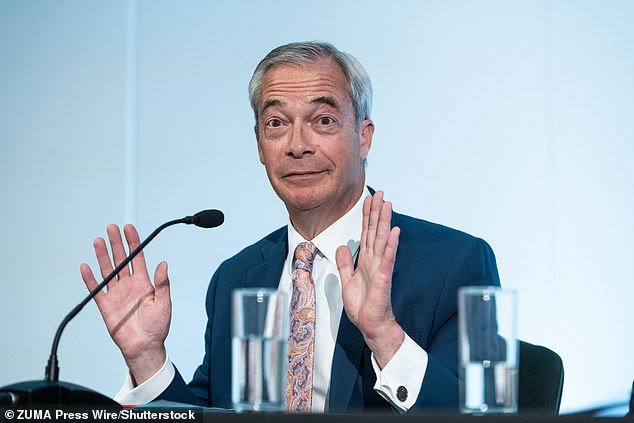Nigel Farage vowed to give Labour ‘a real shock’ after it announced plans to lower the voting age to 16 – but it could help keep him out of power.
Sir Keir Starmer yesterday unveiled controversial plans to widening the franchise and bring national elections in line with those for the Scottish and Welsh assemblies.
But the move, a manifesto pledge from the party, has been criticised because a large proportion of young voters support Labour.
MailOnline’s own analysis of the 2024 election result suggests Labour could have won up to nine extra seats if 16 and 17-year-olds had been allowed to vote.
Last night Mr Farage said: ‘It’s an attempt to rig the political system, but we intend to give them a nasty surprise.’
But while Mr Farage’s Reform UK is comfortably ahead in national polls of all eligible voters aged 18 and over currently, it’s popularity is much lower among Gen Z.
Analysis by pollsters More in Common gives Labour (31 per cent) a five-point lead among voters aged 18 to 26, with the Greens (26 per cent) second and Reform a distant third on 14 per cent.
Luke Tryl, executive director of More in Common said: ‘Given young voters tend to lean to the left, we should expect the Greens and Labour to be the bigger winners of extending the vote to 16 and 17 year olds, with Reform doing well among young men, and the Tories the big losers.

Last night Mr Farage said: ‘It’s an attempt to rig the political system, but we intend to give them a nasty surprise.’

MailOnline’s own analysis of the 2024 election result suggests Labour could have won up to nine extra seats if 16 and 17-year-olds had been allowed to vote.
‘But 16-17 year old voters would only make up a small proportion of the electorate, so are unlikely to shift the dial politically at a national level. That said in a fragmented political landscape, even small changes can have big effects locally.’
Using Government statistics, MailOnline calculated how many teens within that age bracket lived in each of England’s 543 constituencies.
Turn-out figures from the 2024 election were used to estimate the proportion of 16 and 17-year-olds who might vote, based on voting intention polls collated by Merlin Strategy.
Under that scenario, Labour would have secured an extra 260,000 votes and nine seats – taking six from the Tories and one from Reform. Two of Jeremy Corbyn’s Independent MPs would have been stopped from getting in, too.
Meanwhile Angela Rayner faced embarrassment last night after she wrongly claimed that young people can marry at 16 as she tried to justify lowering the voting age.
The Deputy Prime Minister accused the Conservatives of ‘running scared’ from young people, who she said deserved a ‘stake in the future’. Writing in The Times, Ms Rayner said young people ‘contribute to society’ and that she herself had faced ‘serious responsibilities’ as a teenage mother.
She added: ‘By law [16-yearolds] can get married and serve in the Armed Forces – but, unlike their peers in Scotland and Wales, in England and Northern Ireland they can’t vote. Why not?’
The Times later removed this reference from the article, and a note was added, saying: ‘In an earlier version, Angela Rayner incorrectly suggested that 16-year-olds can get married in England. The minimum age was raised to 18 in 2023.’
The elections watchdog warned of a risk of voter fraud last night over Labour plans to allow the public to use bank cards to prove their identity at polling stations.
Existing laws require people to show photographic ID such as a passport or driving licence at the polling station before they can vote.
But Labour’s plan would make the system more ‘accessible’ by allowing people to use a bank card as proof of identity, even though it would not allow polling station staff to confirm a voter’s likeness against a photograph.
The Electoral Commission, which oversees Britain’s voting system, last night said using bank cards ‘has risks for security and voter trust’. Tory spokesman Paul Holmes also warned switching to non-photographic ID could ‘undermine the security of the ballot box’.
Advertisement
